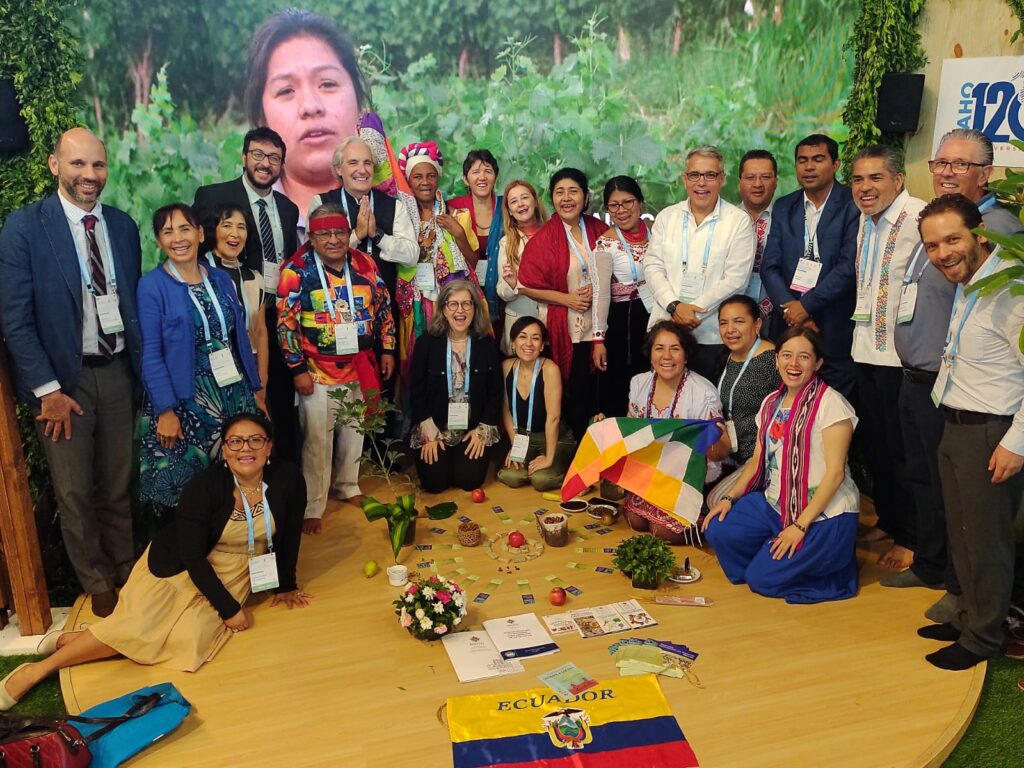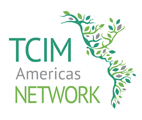With BIREME and PAHO, WHO’s First Global Summit on Traditional Medicine highlights scientific evidence and integration into health systems

Held in India on August 17 and 18, the First Global Summit on Traditional Medicine of the World Health Organization (WHO) was attended by BIREME in technical cooperation with the Pan American Health Organization (PAHO). Selected as a good practice in the region, the Virtual Health Library for Traditional, Complementary and Integrative Medicine (VHL TCIM Americas) served as a platform for the products and services promoted at the Summit’s exhibition space for WHO Regional Offices. Twenty-five countries from the region were represented by the American delegation, including official representatives, experts and care providers.
The event was held in parallel to the G20 Health Ministers’ meeting, and its main objective was to promote the integration of demonstrably beneficial traditional medicine interventions into health systems. According to WHO estimates, 88% of all countries make therapeutic use of practices such as indigenous medicines, herbal medicine, acupuncture and others. In the region of the Americas, 17 nations and territories have their own laws, policies and programs to recognize, protect and include knowledge based on tradition and ancestry in their health systems. Thereby, the organizations recognize that for millions of people around the world, traditional medicine is the first step in the journey towards health care.
Over the past five years, the inclusion and integration of Traditional, Complementary and Integrative Medicines (TCIMs) into health systems has been part of the efforts led by the Pan American Health Organization (PAHO) and WHO to promote people-centered health services. Within PAHO/WHO’s Action Plan on Ethnicity and Health 2019-2025, one of the strategies designed to improve access to scientific evidence and experience exchange in this field was implemented in technical cooperation with BIREME, through the publication of the Virtual Health Library on Traditional, Complementary and Integrative Medicine (VHL TCIM Americas) and the development of thematic Evidence Maps and Knowledge Windows.
According to Dr. Jarbas Barbosa, Director of PAHO, “The implementation of these initiatives and the impact of the COVID-19 pandemic have highlighted the importance of intercultural approaches for the development of quality health interventions and people-centered health services and systems.” Ultimately, this is about contributing to Universal Health Coverage (UHC) for all people, especially marginalized populations, reducing inequities between and within countries.
Verônica Abdala, Manager of Information Services and Sources at BIREME/PAHO/WHO, says that it took three months of work to develop the Information Platform of the Americas displayed during the Summit in India. “The VHL MTCI Americas exhibition was a cooperation project established between BIREME and the Primary Health Care and Integrated Service Delivery Unit (PH) of PAHO’s Department of Health Systems and Services (HSS), which also had the collaboration of the Equity, Gender, Human Rights and Cultural Diversity Unit of PAHO’s Department of Social and Environmental Determinants for Equity in Health, and the Executive Secretariat of the MTCI Americas Network”.
The cooperation included the following items: a) updating the VHL TCIM Portal (content and design); b) developing new regional information products on Indigenous and Afro-descendant Traditional Medicine in the Americas; c) developing a website as a unique space for regional representation (Americas) at the Summit. In India, visitors to PAHO’s exhibition were able to learn how the broad ethnic, cultural and linguistic diversity found in the Region of the Americas is manifested in concrete projects and initiatives. Also on display were PAHO’s strategies which, through technical cooperation with the countries, seek to strengthen these efforts by developing policies and tools – such as the VHL MTCI Americas – to promote access to the best scientific evidence.
Some of the achievements include:
– PAHO/AMRO website for the Summit – created as an aggregating and representative space for the interculturality and pluralism of the health systems and practices of the countries of the Americas.
– Welcome video by PAHO Director Dr. Jarbas Barbosa, and video presenting Traditional Medicine of the Americas, both produced in collaboration with the PAHO Communications Unit.
– Collection of 65 electronic posters representing experiences of integrating TCIM into national health systems, research programs and results, institutional and collaborative initiatives in the Region of the Americas.
– Development and publication of 2 Knowledge Windows: Traditional Medicine of the Americas, and Ethnicity and Health.
– Validation of data from the mapping of available information on Indigenous and Afro-descendant Traditional Medicine in the Americas, in the context of the PAHO/WHO Strategy and Plan of Action on Ethnicity and Health 2019-2025; and platform for presenting the validated data in the “Country Profiles” section.
BIREME was also represented by its Director, João Paulo Souza, who presented the Evidence Maps developed in collaboration with the Brazilian Academic Consortium for Integrative Health (CABSIN), in Parallel Session 1A “Mapping the evidence: what we know and how we learn more”. For João Paulo Souza, this is a very encouraging moment for this community: “With the establishment of the WHO Global Center, we see the emergence of a field of work that will help us build a prospective and continuous evidence surveillance system on traditional and complementary medicine.” All the presentations and the official program are available in full on the Summit webcast on the event’s online portal.
As Brazil takes over the presidency of the G20 in 2024, expectations are good for ensuring that the Americas are represented. The Secretary of Indigenous Health of the Brazilian Ministry of Health, Weibe Tapeba, celebrates the approval of the 1st WHO Resolution on the Health of Indigenous Peoples in May 2023, an articulation in which he had a leading role “In the 75 years since the WHO was founded, it was the first time that the organization adopted a resolution on the health of indigenous peoples. This resolution points to the need to promote and value traditional knowledge and indigenous medicines. The summit, organized by the WHO in India, demonstrates the need for Brazil to be one of the leading countries in this area.”
As part of WHO's and PAHO's efforts to improve people-centered health services and achieve #UniversalHealthCoverage for all, BIREME has been working to enhance the existing evidence for TCIM in the Americas Region. pic.twitter.com/HNIPwbQKOf
— BIREME (@bireme) August 17, 2023
The WHO Summit for Traditional Medicines will meet again in 2025, in a region yet to be announced.
Links of interest:
Window of Knowledge Traditional Medicines of the Americas (bvsalud.org)
Window of Knowledge Ethnicity and Health (bvsalud.org)
The First WHO Traditional Medicine Global Summit – PAHO/WHO | Pan American Health Organization


